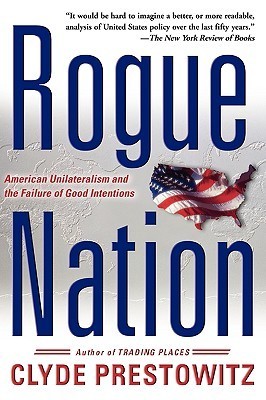





Rogue nation : American unilateralism and the failure of good intentions
Clyde Prestowitz
Tersedia di:
Deskripsi
During the six months prior to the World Trade Center attack, the United States walked away from a treaty to control the world traffic in small arms, the Kyoto accords, a treaty to combat bioterrorism, and many other international agreements. After 9/11 there was a flurry of coalition building, but Europe and Asia quickly came to see the conflict in Afghanistan as an American war with Tony Blair leading cheers from the sidelines. Recent American calls to action in Iraq have only reinforced international perception that the U.S. plans to remain a solitary actor on the world stage. Despite our stated good intentions--the causes of justice and democracy--we have become the world's largest rogue nation.The Bush administration did not invent the American tradition of unilateralism, but, Clyde Prestowitz argues, they have taken it to unprecedented heights. Rogue Nation explores the historical roots of the unilateral impulse and shows how it helps shape American foreign policy in every important area: trade and economic policy, arms control, energy, environment, drug trafficking, agriculture. Even now, when the need for multilateral action--and the danger of going it alone--has never been greater, we continue to act contrary to international law, custom, and our own best interests.
Ulasan
Buku Rekomendasi Lainnya

Asas-asas hukum pidana
Moeljanto

Memantapkan Pemerintah yang Kuat Bersih dan Berwibawa
SYARIFUDDIN, Ateng

Oprah
KELLEY, Kitty

The Little Hen
NAYER, Judy

Me and Earl and The Dying Girl
Andrews, Jesse

Raffles Dan Invasi Inggris Ke Jawa
Tim Hannigan

Read And See
-

Seeing your life through new eyes : Cara baru memandang hidup
Paul Brenner ; Donna Martin ; Penerjemah: Joko Subinarto

Benda sisa ruang angkasa : Sebuah buku tentang komet, asteroid, dan meteoroid
Dana Meachen Rau (Pengarang)

Lurik : Garis-garis bertuah (the magic stripes)
-

20 M; ragam aktivitas kreatif PAUD dan TK
Rini Fazriana (Pengarang) ; Adib (Pengarang)

Guru luar biasa
-

Perempuan seistimewa bidadari
Qurrata Aini (Pengarang) ; Intan Rainy Legita (Ilustrator)

Sayang ibunda : sebuah novel
Motinggo Busye (Pengarang)


